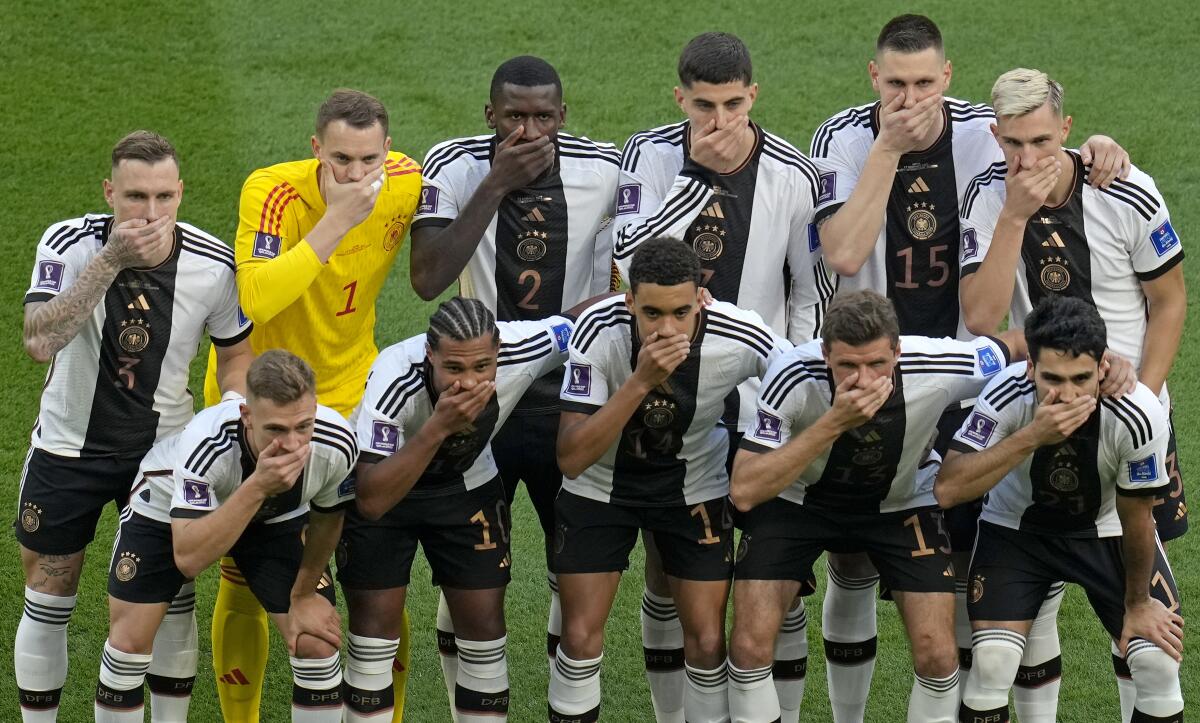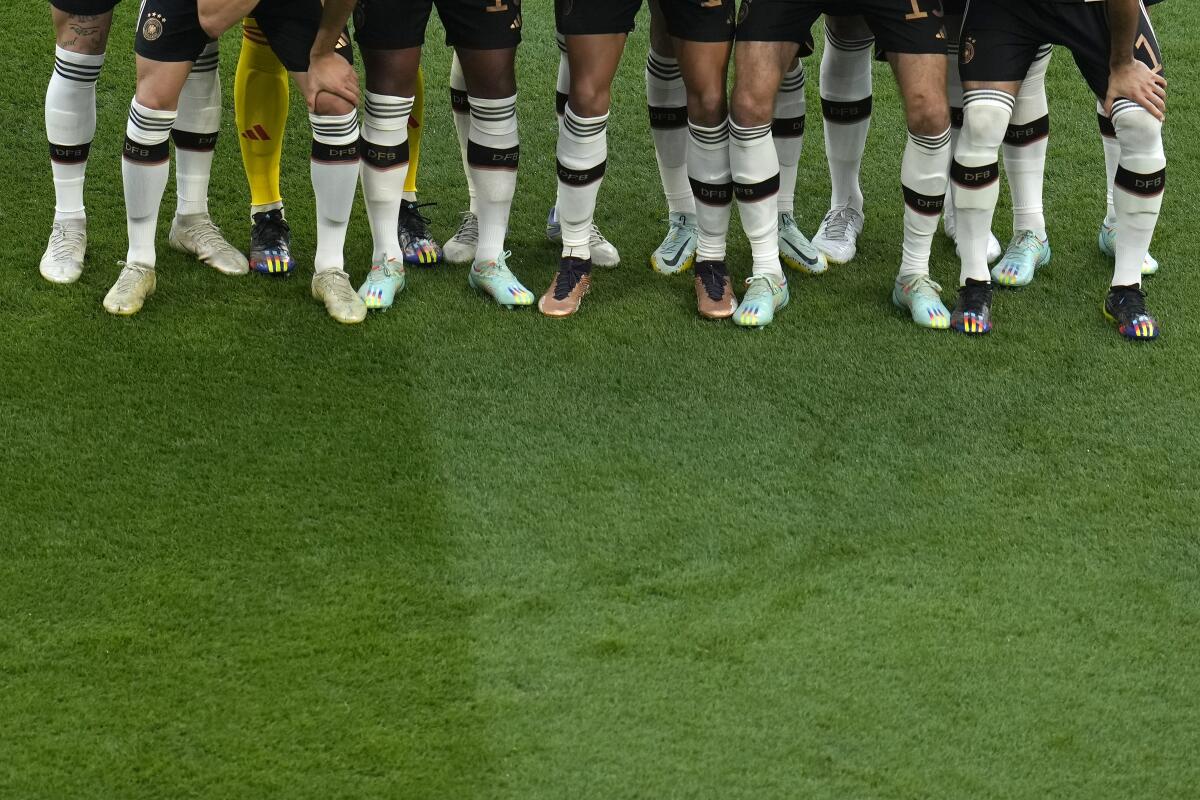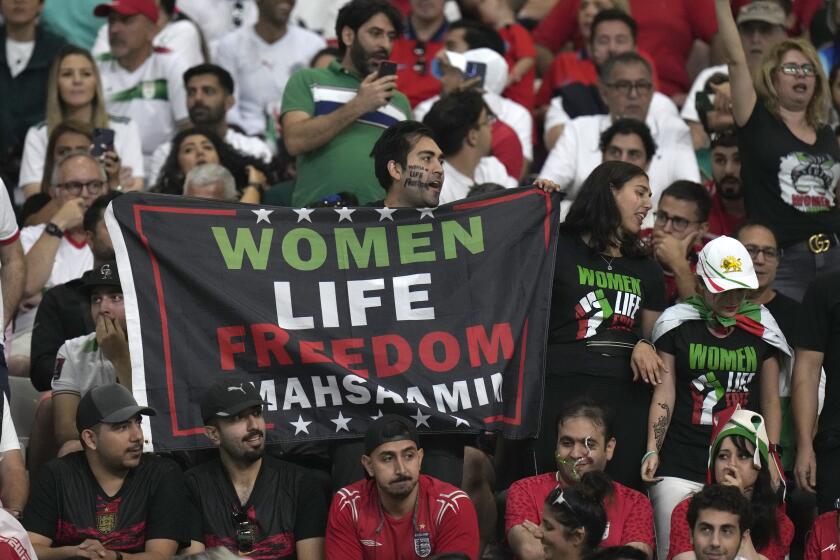World Cup: German players protest FIFA rainbow ban, call human rights nonnegotiable

AL RAYYAN, Qatar — German players placed their hands over the mouths during their pregame photo and wore rainbow-colored stripes on their warmup shirts and cleats before Wednesday’s game with Japan, the most dramatic move yet yet against FIFA’s efforts to keep World Cup teams from protesting Qatar’s dismal human rights record.
Germany was one of seven European teams that planned to have its captain wear a OneLove armband to promote tolerance, diversity and LGBTQ rights in Qatar, where same-sex relationships are banned. FIFA responded Monday by threatening to issue a yellow card to any player wearing the armband.
But if FIFA President Gianni Infantino thought that would end the matter, he has been proved wrong.
FIFA threatened to sanction World Cup players wearing armbands in support of the LGBTQ community. Iran’s players refused to sing the national anthem.
Germany’s gestures were just part of a rapidly escalating campaign against Infantino’s edict. German Interior Minister Nancy Faeser, who sat next to Infantino at Wednesday’s game, wore the armband prominently and U.S. Secretary of State Anthony J. Blinken weighed in on the controversy during his recent visit to Qatar.
Speaking at a news conference, Blinken said “any restrictions on freedom of expression” were “always concerning” to the United States. “It’s especially so when the expression is for diversity and for inclusion,” Blinken continued. “And in my judgment, at least, no one on a football pitch should be forced to choose between supporting these values and playing for their team.”
After the match Germany lost 2-1, German coach Hansi Flick said his team delivered “a message …. that FIFA is silencing us.” The German national team has a long record of standing up for human rights.

The German soccer federation also backed its players, posting a strongly worded statement on Twitter shortly after the game against Japan kicked off.
“We wanted to use our captain’s armband to take a stand for values that we hold in the Germany national team: diversity and mutual respect. Together with other nations, we wanted our voice to be heard,” it read. “It wasn’t about making a political statement — human rights are non-negotiable. That should be taken for granted, but it still isn’t the case. That’s why this message is so important to us. Denying us the armband is the same as denying us a voice. We stand by our position.”
According to the newspaper Bild, the German federation is exploring a legal challenge to FIFA’s decision.
“FIFA has forbidden us to make a sign for diversity and human rights. It has combined this with massive threats of sporting sanctions without specifying them,” DFB spokesman Steffen Simon said. “The [federation] is checking whether this action by FIFA was lawful.”
Injury woes for France, Senegal
France, which came to Qatar missing five players to injury, lost another one Wednesday when coach Didier Deschamps issued a statement saying that Lucas Hernandez, the starting left back for the World Cup winners four years ago, would miss the rest of this tournament after rupturing the ACL in his right knee in the first eight minutes of Tuesday’s win over Australia.
Last week Ballon d’Or winner Karim Benzema was ruled out of the World Cup after picking up an injury in training.
Senegal is also having injury problems. Already missing Sadio Mane, the African player of the year, Senegal will likely be without midfielder Cheikhou Kouyate for Friday’s game with the Qatar because of right hamstring injury. Kouyate, a key central midfielder for Senegal, went off on a stretcher in the second half of his team’s tournament-opening loss to the Netherlands.
Kouyate’s 84 international caps are tied for fifth all-time in Senegal.
Ticket issues flare up
Problems with FIFA’s mobile ticket application continue to inconvenience fans who have been unable to retrieve the digital passes needed to enter the stadium.
On Tuesday an Associated Press reporter at Al Janoub Stadium saw a FIFA staffer writing out replacement tickets with pen and paper in an attempt to get people to their seats. Other fans were admitted after showing security workers emails confirming their ticket purchase.
Ticket problems have plagued several venues, leading organizers to set up ticket resolution desks. All tickets to the Qatar World Cup were distributed via the FIFA mobile app. The glitch caused hundreds of fans to miss the start of Monday’s Iran-England game.










